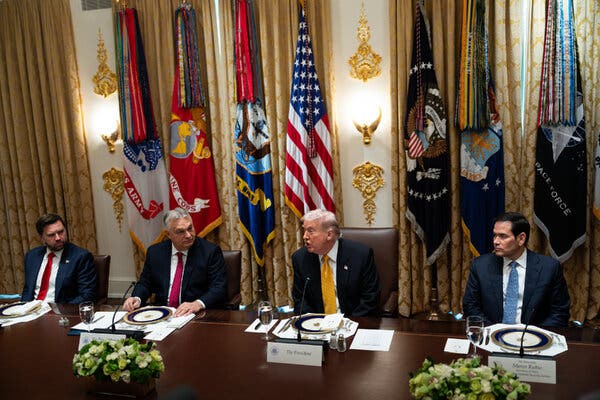President Donald Trump has provided Hungary with a one-year exemption from sanctions related to the purchase of Russian oil. This decision was made during a meeting with Hungary’s Prime Minister Viktor Orban at the White House on March 15, 2024. The exemption is part of a broader agreement aimed at addressing the economic challenges Hungary faces due to its energy reliance on Russia.
The sanctions, which target countries purchasing Russian oil, are intended to pressure Russia to cease its military actions in Ukraine. According to a White House official who spoke on the condition of anonymity, the exemption represents a significant diplomatic victory for Orban, who is currently navigating a challenging re-election campaign.
Following the meeting, Orban announced the agreement on social media, stating that it included a commitment from the United States to supply Hungary with liquefied natural gas, amounting to contracts worth approximately $600 million. He emphasized that Trump had “guaranteed full sanction exemptions” for two major pipelines: TurkStream and Friendship. This assurance allows Hungary to maintain its status as one of the countries with the lowest energy prices in Europe.
Hungary’s energy strategy heavily relies on Russian imports, with approximately 86 percent of its oil sourced from Russia. This dependency has been exacerbated since the start of the war in Ukraine in 2022, according to research from the Atlantic Council. Orban reiterated that Hungary’s options are limited compared to its European neighbors, primarily due to its reliance on pipeline infrastructure.
During the meeting, Trump expressed understanding of Hungary’s situation, noting the country’s landlocked status and its lack of access to ports. He stated, “It’s a great country, it’s a big country, but they don’t have sea… They don’t have the ports, and so they have a difficult problem.” This acknowledgment highlights Trump’s willingness to accommodate Hungary’s unique energy challenges.
Despite granting Hungary the exemption, Trump criticized other European nations for continuing to buy Russian oil, expressing concern over their commitment to sanctions. He has long urged European countries to halt their purchases, as oil revenue remains a critical funding source for the Russian military.
The exemption for Hungary marks a notable concession from the United States, representing one of the most significant measures taken against the Russian energy sector since the onset of the conflict. Orban has shown a tendency to align with Trump on various issues, including his controversial stance advocating for Ukraine to cede territory to Russia as a means to achieve peace.
This diplomatic engagement reflects not only Hungary’s energy needs but also the intricate geopolitical landscape shaped by the ongoing war in Ukraine. As Orban navigates his re-election campaign, the outcomes of these agreements could have lasting implications for Hungary’s political and economic future.






































































